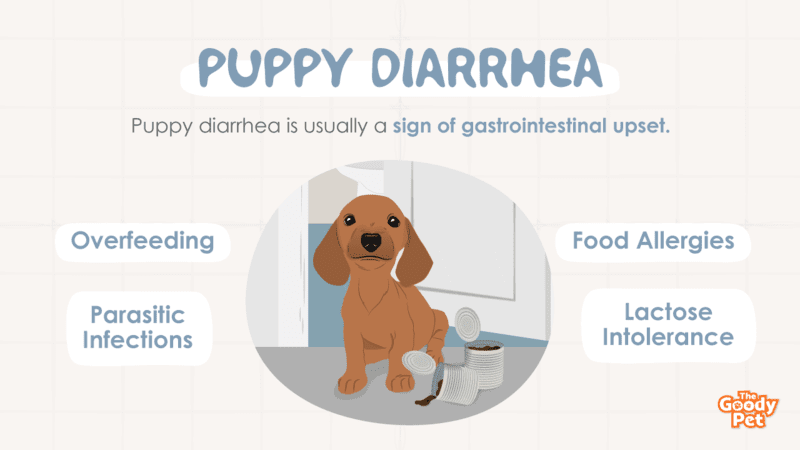One of the least glamorous parts of the job when it comes to raising a puppy is dealing with potty break clean-up. Things cross the line from being nasty to being troublesome when your puppy starts to diarrhea.
Puppy diarrhea is usually a sign of gastrointestinal upset. This may happen as a result of consumption of food that irritated the tract from toxic substances to foods your dog may be allergic to.
Puppy diarrhea could also be as a result of other physical and psychological health issues that affect gut health and functionality.
In the Q&A section below, you will have all questions you have about puppy diarrhea answered and more you didn’t even realize you needed to ask. That way, you will know exactly what to do for your pooping pooch.
Why Does My Puppy Have Diarrhea All Of A Sudden?
There are many reasons why your puppy may be having diarrhea. Here are some of the most common causes:
- Parvovirus infection of the gut
- Other parasitic infections, including worm infestations
- Overfeeding
- Food allergies
- Lactose intolerance
- Ingestion of poisonous substances
Sometimes, the reasons why your puppy’s poop is liquid could be simple, normal processes without any underlying condition. This is common when the puppy is teething or going through weaning.
Understanding all these reasons why your puppy is experiencing diarrhea is important for many reasons. One reason is that it helps you plan your care routine including your dog’s diet to prevent future recurrences.
Figuring out the cause also helps you determine the best cause of action. This, of course, is with the vet’s guidance.

Can Overfeeding Cause Diarrhea In Puppies?
Overfeeding is one of the common causes of diarrhea in puppies. It may happen in puppies that are still on breastmilk or those settling into their new solid diet.
Diarrhea happens in cases of overfeeding as the puppy’s gut is still developing and thus may not be strong enough to handle too much too fast. By overeating, the puppy may suffer indigestion with irritation of the entire gut.
Most dog owners are familiar with signs and symptoms like vomiting, panting, and even swelling of the abdomen. However, diarrhea may also occur in the same puppies a few hours to a day or two after they overeat.
The solution here goes without saying. Simply monitor your dog’s volume intake. In these cases, it would help to figure out recommended daily portions based on the dog’s breed and age. You could also invest in feeding bowls that help slow your puppy down as they eat.
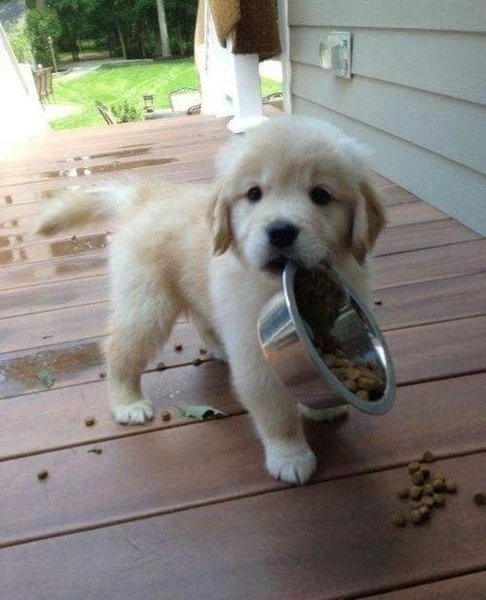
Can Puppy Teething Cause Loose Stool?
Puppy teething can cause the doggy to pass loose stools.
So what does tooth eruption have to do with the gut’s functionality? Well, it is not a very distinctively described connection.
However, it is a well-known fact that some puppies display gut signs and symptoms including diarrhea, loss of appetite, vomiting, and abdominal tenderness.
Diarrhea in these cases will occur when the dog is teething and will usually last the first few months of the teething process. In some puppies, the digestive tract signs and symptoms last throughout the teething phase and disappear spontaneously when the dog is done teething.
With diarrhea in puppies as a result of teething, the best thing you can do for your dog is feed them healthy puppy food and keep them comfortable and hydrated.

What Are Signs Of Parvo In A Puppy?
Parvo is a viral infection of the digestive tract and primarily causes symptoms associated with gut irritation including diarrhea. A lot of the actual symptoms are difficult to pick up on as dogs, unfortunately, can’t verbalize a tummy ache or discomfort.
Fortunately, there are a few other non-specific signs which together with diarrhea should help get parvo on your radar. These symptoms include:
- Loss of appetite
- Reduced energy levels and activity
- Tenderness around the abdomen when handled
- Vomiting
- Bloating with abdominal distension or increased flatulence
Something to note about the character of the diarrhea in parvo is that it might be bloody. This could result in life-threatening blood and fluid loss. It is therefore very important to have your puppy treated promptly.
The good news about parvo in puppies is that it is easily preventable. You just need a balance of timely parvovirus vaccination and good hygiene practices when handling your dog’s food and water.
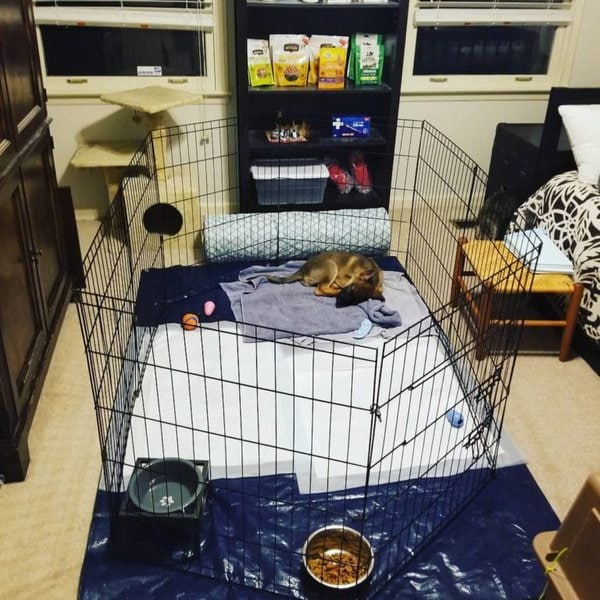
Is It Normal For Puppies To Have Occasional Diarrhea?
It is normal for puppies to have occasional diarrhea without any particular insidious causes to be discovered. This is because puppies are still developing which also goes for their digestive system.
As they are exposed to new foods and new environments to explore, they are likely to encounter foods that their guts haven’t yet adequately adapted to. Psychological adjustment to things like new homes could also trigger transient diarrhea.
So no, not every case of diarrhea in your puppy is a cause for alarm. However, it is always best to have a vet examine your pooch just to be safe.
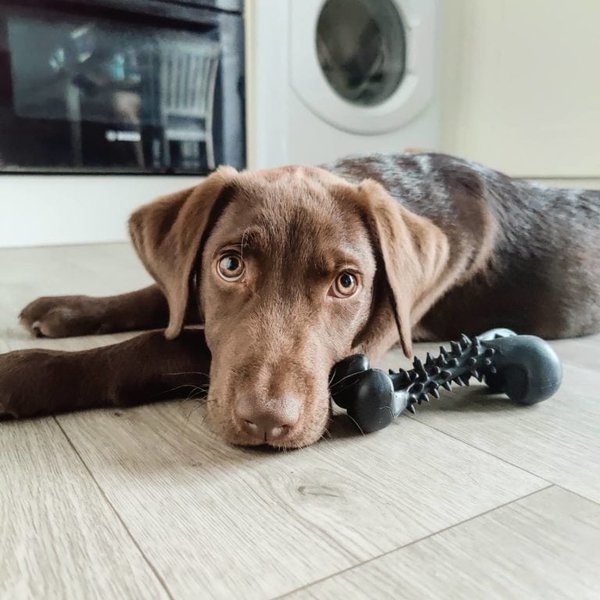
How Long Does Puppy Diarrhea Last?
How long diarrhea in a puppy will last depends entirely on the cause.
If it is something like an infection with bacteria, fungi, or viruses like parvovirus, the diarrhea will last a few days to a week or two. This is about how long it takes for medication to work.
If the diarrhea lasts longer than this, consider treatment failure or another cause entirely.
For other causes like psychological distress or even diarrhea due to teething, the loose stools may persist for months.
How long the diarrhea lasts in a puppy also depends on what measures are taken to manage the problem and treat the cause.
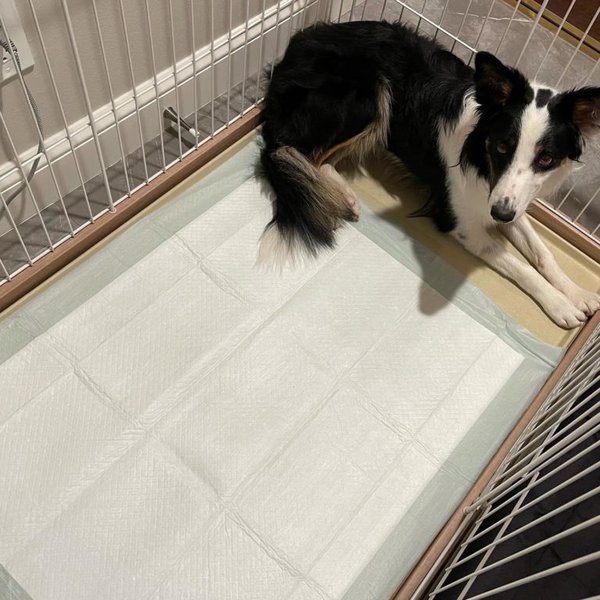
When Should I Worry About My Puppies Diarrhea?
Diarrhea in general is never a sign of good things in your puppy and is thus worth worrying about from the moment you notice their first loose bowel movement. However, not all causes of puppy diarrhea are the same.
Some causes of diarrhea that may be more worrying than others are the likes of parvovirus infection, food intolerance, and ingestion of toxins. Some of the symptoms associated with these concerning causes of puppy diarrhea include:
- Blood in the diarrhea
- Numerous bouts of diarrhea with a lot of fluid loss
- Excessive vomiting
- Foaming at the mouth
- Weight loss due to loss of appetite
If you notice any of these signs or have a reason to suspect a troublesome cause of puppy diarrhea, you should get your dog to the vet as soon as possible.
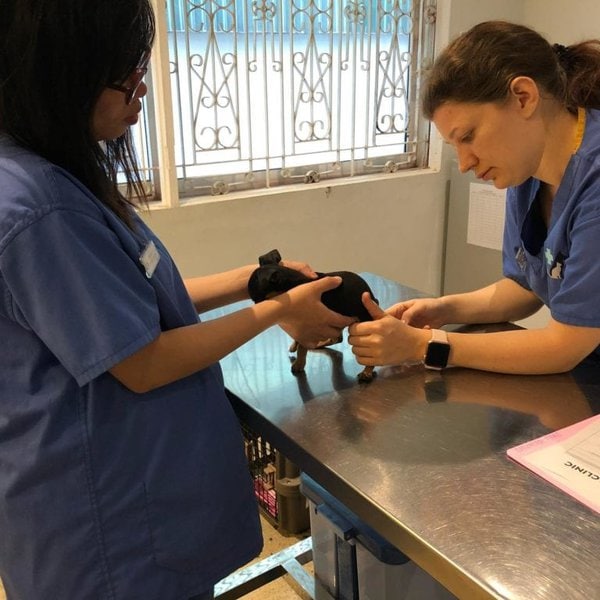
How Do You Treat A Puppy With Diarrhea?
The best way to treat a puppy with diarrhea is by taking them to the vet. There are way too many possible complications for you to take chances with your dog’s health and well-being.
To help you out, here is a brief summary of some of the ways in which you could treat a puppy with diarrhea from home. However, it is important to understand that none of these strategies are replacements for a doctor’s advice. However, they should help move things along.
Without further ado, here are a few ways you could treat a puppy with diarrhea:
Keep The Dog Hydrated
Your puppy will lose a lot of water from diarrhea, associated vomiting, and panting due to the discomfort. They can very easily develop dehydration and other complications like shock. This can very easily be prevented by keeping your dog hydrated.
Just leave out a fresh bowl of water near your dog and let them drink whenever they can and feel up to it. If the puppy’s low appetite is also affecting their water consumption, consult with your vet on alternative ways to replace your dog’s lost fluids.
Get Rid Of Any Trigger Foods
A lot of times, diarrhea in puppies is caused by the foods that they eat. This is the case mainly with diarrhea caused by lactose intolerance or food allergies including grain and gluten allergies.
If you suspect that your dog is suffering from diarrhea as a result of a specific food, one of the easiest ways to treat them from home is by eliminating that food from the dog’s diet.
Keep Puppy Safe And Comfortable
Puppies can have diarrhea as a result of psychological stress. Keeping the dog safe and comfortable goes a long way towards stopping physical symptoms like diarrhea.
In cases where the cause of the diarrhea is more of a physical one, keeping your dog comfortable also helps a lot with the treatment process. It will help ease some of their discomfort and the stress brought about by the illness.
Transition To A High Fiber Diet
A good way to promote the formation of solid stool in your puppy is through a high fiber diet. The fiber adds to the density of the dog’s bowel movements.
A high fiber diet is also favorable to the protective gut microbiome which could also help reduce dehydration and its local effects.
In addition to all these general care practices for a dog suffering from diarrhea, there are a few more specific ways you can help your dog.
These interventions include medication, switching to more neutral foods like scrambled eggs, and even entire diet overhauls with the introduction of gut-friendly options like the BRAT diet.
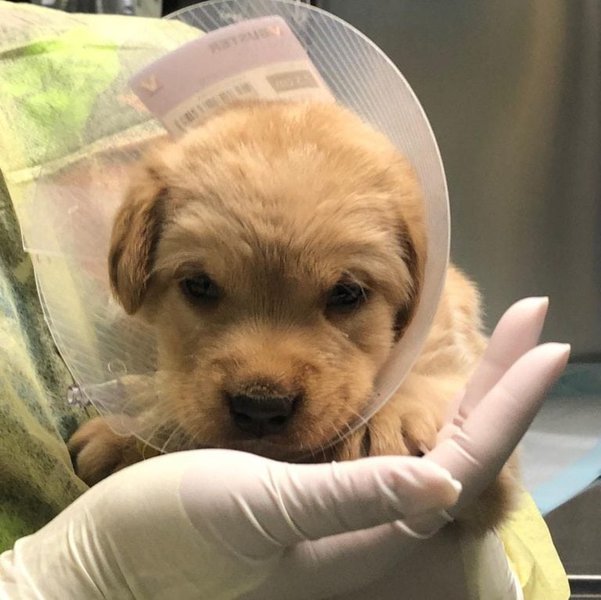
What Can You Give A Puppy For Diarrhea?
One of the most important things you need to give your puppy if they are suffering from diarrhea is fluids with electrolytes.
Water alone may not be sufficient especially if your puppy has lost a lot of fluids from diarrhea and vomiting.
A fantastic solution in this case would be electrolyte-rich preparations like Pedialyte. It is actually safe to give your puppy just a bit of this drink to replenish their electrolytes.
A great way to give your ailing puppy some Pedialyte would be to add a few tablespoons of the drink to the dog’s water. For the best results here, go for Pedialyte that is flavorless. And as with any other medication you give your dog, it is best to consult your vet for the green light.
In the meantime as you figure out how to stop puppy diarrhea fast, you could make cleanup easier for you with Amazon Basics Male Dog Wrap Disposable Diapers. These doggy diapers are easy to put on and with a leak-proof design.
How Do You Stop Diarrhea In Puppies Naturally?
The best way to stop diarrhea in puppies naturally is through good food and proper hydration. Medication will also help a lot especially with treatment of the actual cause of the diarrhea.
Food
When it comes to food, you want to temporarily switch to bland yet nutritious foods that are easy to digest. This will make things easier on your dog’s irritated gut and may prevent worsening of symptoms.
Medication
Sometimes, good food alone is not enough when dealing with puppy diarrhea. You must establish and manage the cause of the problem if you want to end your puppy’s misery once and for all.
This is where your vet will come in. Their expertise combined with extensive medical tests will allow them to find the cause and make the best decisions on how to treat your dog.
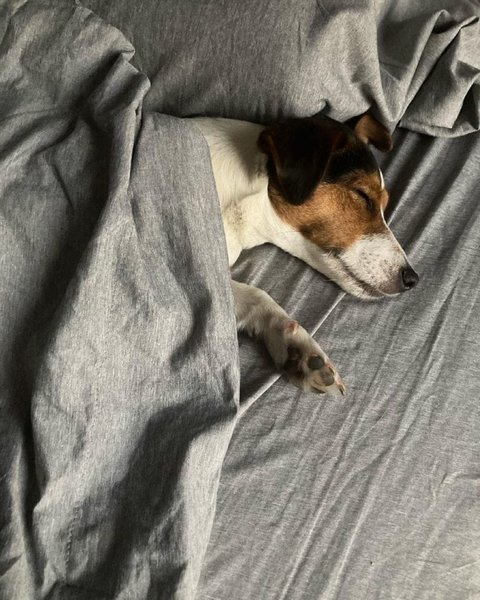
Is Scrambled Egg Good For Puppies With Diarrhea?
Scrambled eggs are great for puppies with diarrhea. Contrary to popular beliefs, they do not instantly cure diarrhea.
However, their high nutritional content comes in very handy when it comes to keeping the puppy alive and strong even through periods of low appetite.
Another awesome thing about scrambled eggs is that they are tasty for the dog that may need a bit more convincing to eat something.
Finally, scrambled eggs offer the benefit of being easy to digest. This is exactly what the often traumatized digestive tract of the puppy needs as it recovers.
When feeding a puppy with diarrhea and appetite issues, it is best to stick to one egg or even less for younger pups. Just scramble them up and divide the eggs into different portions to be fed to the dog all day.

Is The BRAT Diet Good For Puppies With Diarrhea?
You can actually give your puppy the BRAT diet to help manage their diarrhea. The BRAT diet consists of bananas, rice, applesauce, and toast. While originally meant for human consumption during similar episodes, it has a lot to offer your dog. The bananas, rice, and applesauce in particular will help your puppy a lot.
Bananas are rich in energy and electrolytes including potassium which is lost due to diarrhea.
Rice on the other hand is another great source of starchy carbohydrates for energy. It is also easier to digest than most other grains and starches.
Applesauce is rich in flavor and vitamins. It is worth trying out especially if your puppy is having appetite issues. Just add a bit too bland foods like rice or boiled chicken to make it a bit more exciting for the doggy.
It is best to leave out the toast part of this home remedy diet, as this may be slightly more difficult to digest. This is the case especially if the dog’s diarrhea is as a result of gluten allergies.
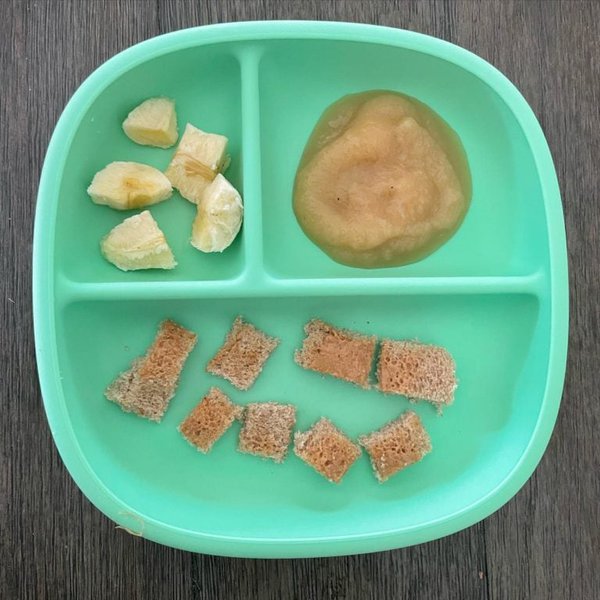
What Is The Best Food To Give A Puppy With Diarrhea?
The best food to give a dog with diarrhea is something that is easy to digest while also being very rich in nutrients. The aim of feeding your puppy when they are experiencing diarrhea is to keep them well-nourished despite the low appetite levels.
You also have to be aware of the possibility of ongoing gut irritation or fatigue from the diarrhea. You want to feed your dog foods that will be gentle on the digestive tract in addition to being nutritional. Here are some foods that fit this description.
- Plain rice
- Boiled, unseasoned chicken
- Scrambled eggs
- Soft dog-friendly fruits
- Boiled pumpkin
Once your dog is back to good health, you will have to consider putting them on an all-natural diet in which case we recommend Pet Plate. This meal service customizes the menu to your dog’s specific needs. You are also guaranteed quality for your dog’s sake with the use of human-grade ingredients.
How Do You Get Rid Of Puppy Poop?
There are many ways to get rid of puppy poop from your furniture and floors including cleaning immediately with water and soap. Here are a few other tips that should help.
- Enzymatic cleaners for pet-related messes
- Apple cider vinegar and water
- Baking soda to get rid of the smell
- Deep cleaning upholstery, carpeting, and linen
In addition to cleaning up your home after your puppy accidentally diarrheas, you need to clean up the dog itself. Giving them a batch after each bowel movement may be impractical for you and traumatizing for the pooch.
That’s why we recommend Glandex Dog Wipes For Pets which has deodorizing effects in addition to skin-soothing ingredients like aloe vera and vitamin E.

